Bitter Phytochemicals Acutely Lower Blood Glucose Levels by Inhibition of Glucose Absorption in the Gut
Abstract
1. Introduction
2. Materials and Methods
2.1. Reagents and Diets
2.2. Animal Study
2.3. Oral Glucose Tolerance with Diverse Classes of Plant Phytochemicals
2.4. Glucose Tolerance and Different Routes of Administration
2.5. RNA Extraction, Purification, and cDNA Synthesis
2.6. Quantitative PCR Analysis
2.7. Cell Culture and Glucose Uptake Measurements
2.8. Calcium Influx Assays
2.9. Cell Viability Assays
2.10. Statistical Analysis
3. Results
3.1. Prediabetic Cohort of Diet-Induced Obese C57BL/6J Mice
3.2. Glucose Tolerance When Treated with Diverse Classes of Plant Phytochemicals
3.3. Glucose Tolerance When Treated with Polymeric Phenolic Compounds
3.4. Glucose Tolerance When Treated with Anthocyanins, Their Metabolites, and Stilbenes
3.5. Glucose Tolerance with a Model Bitter Compound
3.6. Co-Expression of TAS2R and Gastrointestinal Hormones in the Gut
3.7. Glucose Uptake and Ca2+ Signaling in Enteroendocrine STC-1 Cell Model
4. Discussion
5. Conclusions
Author Contributions
Funding
Institutional Review Board Statement
Informed Consent Statement
Data Availability Statement
Conflicts of Interest
References
- Wasserman, D.H. Four Grams of Glucose. Am. J. Physiol. Endocrinol. Metab. 2009, 296, E11–E21. [Google Scholar] [CrossRef] [PubMed]
- DECODE Study Group. Is Fasting Glucose Sufficient to Define Diabetes? Epidemiological Data from 20 European Studies. The DECODE-Study Group. European Diabetes Epidemiology Group. Diabetes Epidemiology: Collaborative Analysis of Diagnostic Criteria in Europe. Diabetologia 1999, 42, 647–654. [Google Scholar] [CrossRef] [PubMed]
- Kotwal, N.; Pandit, A. Variability of Capillary Blood Glucose Monitoring Measured on Home Glucose Monitoring Devices. Indian. J. Endocrinol. Metab. 2012, 16, S248–S251. [Google Scholar] [CrossRef] [PubMed]
- Peter, A.; Fritsche, A.; Stefan, N.; Heni, M.; Häring, H.-U.; Schleicher, E. Diagnostic Value of Hemoglobin A1c for Type 2 Diabetes Mellitus in a Population at Risk. Exp. Clin. Endocrinol. Diabetes 2011, 119, 234–237. [Google Scholar] [CrossRef] [PubMed]
- Kuo, F.Y.; Cheng, K.-C.; Li, Y.; Cheng, J.-T. Oral Glucose Tolerance Test in Diabetes, the Old Method Revisited. World J. Diabetes 2021, 12, 786–793. [Google Scholar] [CrossRef] [PubMed]
- Jagannathan, R.; Neves, J.S.; Dorcely, B.; Chung, S.T.; Tamura, K.; Rhee, M.; Bergman, M. The Oral. Glucose Tolerance Test: 100 Years Later. Diabetes Metab. Syndr. Obes. 2020, 13, 3787–3805. [Google Scholar] [CrossRef] [PubMed]
- Cantley, J.; Ashcroft, F.M. Q&A: Insulin Secretion and Type 2 Diabetes: Why Do β-Cells Fail? BMC Biol. 2015, 13, 33. [Google Scholar] [CrossRef]
- Buse, J.B.; Wexler, D.J.; Tsapas, A.; Rossing, P.; Mingrone, G.; Mathieu, C.; D’Alessio, D.A.; Davies, M.J. 2019 Update to: Management of Hyperglycemia in Type 2 Diabetes, 2018. A Consensus Report by the American Diabetes Association (ADA) and the European Association for the Study of Diabetes (EASD). Diabetes Care 2020, 43, 487–493. [Google Scholar] [CrossRef] [PubMed]
- Barber, M.J.; Gotham, D.; Bygrave, H.; Cepuch, C. Estimated Sustainable Cost-Based Prices for Diabetes Medicines. JAMA Netw. Open 2024, 7, e243474. [Google Scholar] [CrossRef] [PubMed]
- Bansal, N. Prediabetes Diagnosis and Treatment: A Review. World J. Diabetes 2015, 6, 296–303. [Google Scholar] [CrossRef] [PubMed]
- Wagner, C.; De Gezelle, J.; Komarnytsky, S. Celtic Provenance in Traditional Herbal Medicine of Medieval Wales and Classical Antiquity. Front. Pharmacol. 2020, 11, 105. [Google Scholar] [CrossRef] [PubMed]
- Bailey, C.J.; Turner, R.C. Metformin. N. Engl. J. Med. 1996, 334, 574–579. [Google Scholar] [CrossRef] [PubMed]
- Chao, E.C.; Henry, R.R. SGLT2 Inhibition—A Novel Strategy for Diabetes Treatment. Nat. Rev. Drug Discov. 2010, 9, 551–559. [Google Scholar] [CrossRef]
- Jackson, K.M.P.; Rathinasabapathy, T.; Esposito, D.; Komarnytsky, S. Structural Constraints and Importance of Caffeic Acid Moiety for Anti-Hyperglycemic Effects of Caffeoylquinic Acids from Chicory. Mol. Nutr. Food Res. 2017, 61, 1601118. [Google Scholar] [CrossRef] [PubMed]
- Kim, J.; Noh, W.; Kim, A.; Choi, Y.; Kim, Y.-S. The Effect of Fenugreek in Type 2 Diabetes and Prediabetes: A Systematic Review and Meta-Analysis of Randomized Controlled Trials. Int. J. Mol. Sci. 2023, 24, 13999. [Google Scholar] [CrossRef] [PubMed]
- Kizilaslan, N.; Erdem, N.Z. The Effect of Different Amounts of Cinnamon Consumption on Blood Glucose in Healthy Adult Individuals. Int. J. Food Sci. 2019, 2019, 4138534. [Google Scholar] [CrossRef] [PubMed]
- Kim, B.; Lee, H.S.; Kim, H.-J.; Lee, H.; Lee, I.; Ock, S.; Kwon, S.; Kang, S.-S.; Choi, Y. Momordica Charantia (Bitter Melon) Efficacy and Safety on Glucose Metabolism in Korean Prediabetes Participants: A 12-Week, Randomized Clinical Study. Food Sci. Biotechnol. 2022, 32, 697–704. [Google Scholar] [CrossRef] [PubMed]
- Dabe, N.E.; Kefale, A.T. Antidiabetic Effects of Artemisia Species: A Systematic Review. Anc. Sci. Life 2017, 36, 175–181. [Google Scholar] [CrossRef] [PubMed]
- Vong, C.I.; Rathinasabapathy, T.; Moncada, M.; Komarnytsky, S. All Polyphenols Are Not Created Equal: Exploring the Diversity of Phenolic Metabolites. J. Agric. Food Chem. 2022, 70, 2077–2091. [Google Scholar] [CrossRef] [PubMed]
- Deka, H.; Choudhury, A.; Dey, B.K. An Overview on Plant Derived Phenolic Compounds and Their Role in Treatment and Management of Diabetes. J. Pharmacopunct. 2022, 25, 199–208. [Google Scholar] [CrossRef]
- Wang, Y.; Alkhalidy, H.; Liu, D. The Emerging Role of Polyphenols in the Management of Type 2 Diabetes. Molecules 2021, 26, 703. [Google Scholar] [CrossRef] [PubMed]
- Chandrashekar, J.; Mueller, K.L.; Hoon, M.A.; Adler, E.; Feng, L.; Guo, W.; Zuker, C.S.; Ryba, N.J. T2Rs Function as Bitter Taste Receptors. Cell 2000, 100, 703–711. [Google Scholar] [CrossRef] [PubMed]
- Wooding, S.P.; Ramirez, V.A.; Behrens, M. Bitter Taste Receptors: Genes, Evolution and Health. Evol. Med. Public Health 2021, 9, 431–447. [Google Scholar] [CrossRef] [PubMed]
- Huang, L.; Shanker, Y.G.; Dubauskaite, J.; Zheng, J.Z.; Yan, W.; Rosenzweig, S.; Spielman, A.I.; Max, M.; Margolskee, R.F. Ggamma13 Colocalizes with Gustducin in Taste Receptor Cells and Mediates IP3 Responses to Bitter Denatonium. Nat. Neurosci. 1999, 2, 1055–1062. [Google Scholar] [CrossRef] [PubMed]
- Taruno, A.; Vingtdeux, V.; Ohmoto, M.; Ma, Z.; Dvoryanchikov, G.; Li, A.; Adrien, L.; Zhao, H.; Leung, S.; Abernethy, M.; et al. CALHM1 Ion Channel Mediates Purinergic Neurotransmission of Sweet, Bitter and Umami Tastes. Nature 2013, 495, 223–226. [Google Scholar] [CrossRef] [PubMed]
- Meyerhof, W.; Batram, C.; Kuhn, C.; Brockhoff, A.; Chudoba, E.; Bufe, B.; Appendino, G.; Behrens, M. The Molecular Receptive Ranges of Human TAS2R Bitter Taste Receptors. Chem. Senses 2010, 35, 157–170. [Google Scholar] [CrossRef] [PubMed]
- Lossow, K.; Hübner, S.; Roudnitzky, N.; Slack, J.P.; Pollastro, F.; Behrens, M.; Meyerhof, W. Comprehensive Analysis of Mouse Bitter Taste Receptors Reveals Different Molecular Receptive Ranges for Orthologous Receptors in Mice and Humans. J. Biol. Chem. 2016, 291, 15358–15377. [Google Scholar] [CrossRef] [PubMed]
- Ahmad, R.; Dalziel, J.E. G Protein-Coupled Receptors in Taste Physiology and Pharmacology. Front. Pharmacol. 2020, 11, 587664. [Google Scholar] [CrossRef] [PubMed]
- Tuzim, K.; Korolczuk, A. An Update on Extra-Oral Bitter Taste Receptors. J. Transl. Med. 2021, 19, 440. [Google Scholar] [CrossRef] [PubMed]
- An, S.S.; Liggett, S.B. Taste and Smell GPCRs in the Lung: Evidence for a Previously Unrecognized Widespread Chemosensory System. Cell Signal 2018, 41, 82–88. [Google Scholar] [CrossRef] [PubMed]
- Reimann, F.; Tolhurst, G.; Gribble, F.M. G-Protein-Coupled Receptors in Intestinal Chemosensation. Cell Metab. 2012, 15, 421–431. [Google Scholar] [CrossRef] [PubMed]
- Thomas, C.; Gioiello, A.; Noriega, L.; Strehle, A.; Oury, J.; Rizzo, G.; Macchiarulo, A.; Yamamoto, H.; Mataki, C.; Pruzanski, M.; et al. TGR5-Mediated Bile Acid Sensing Controls Glucose Homeostasis. Cell Metab. 2009, 10, 167–177. [Google Scholar] [CrossRef] [PubMed]
- Palatini, K.; Wilson, M.; Alley, J.; Esposito, D.; Komarnytsky, S. Diverse Classes of Bitter Phytochemicals Modulate Carbohydrate Metabolism and Immune Responses through Gastrointestinal Bitter Taste Receptors. FASEB J. 2015, 29, 405.5. [Google Scholar] [CrossRef]
- Palatini, K.M.; Durand, P.-J.; Rathinasabapathy, T.; Esposito, D.; Komarnytsky, S. Bitter Receptors and Glucose Transporters Interact to Control Carbohydrate and Immune Responses in the Gut. FASEB J. 2016, 30, 682.6. [Google Scholar] [CrossRef]
- Dagan-Wiener, A.; Di Pizio, A.; Nissim, I.; Bahia, M.S.; Dubovski, N.; Margulis, E.; Niv, M.Y. BitterDB: Taste Ligands and Receptors Database in 2019. Nucleic Acids Res. 2019, 47, D1179–D1185. [Google Scholar] [CrossRef] [PubMed]
- Williams, L.M.; Campbell, F.M.; Drew, J.E.; Koch, C.; Hoggard, N.; Rees, W.D.; Kamolrat, T.; Thi Ngo, H.; Steffensen, I.-L.; Gray, S.R.; et al. The Development of Diet-Induced Obesity and Glucose Intolerance in C57Bl/6 Mice on a High-Fat Diet Consists of Distinct Phases. PLoS ONE 2014, 9, e106159. [Google Scholar] [CrossRef]
- Hansen, S.R.; Janssen, C.; Beasley, V.R. Denatonium Benzoate as a Deterrent to Ingestion of Toxic Substances: Toxicity and Efficacy. Vet. Hum. Toxicol. 1993, 35, 234–236. [Google Scholar] [PubMed]
- Greene, T.A.; Alarcon, S.; Thomas, A.; Berdougo, E.; Doranz, B.J.; Breslin, P.A.S.; Rucker, J.B. Probenecid Inhibits the Human Bitter Taste Receptor TAS2R16 and Suppresses Bitter Perception of Salicin. PLoS ONE 2011, 6, e20123. [Google Scholar] [CrossRef] [PubMed]
- Hayakawa, T.; Suzuki-Hashido, N.; Matsui, A.; Go, Y. Frequent Expansions of the Bitter Taste Receptor Gene Repertoire during Evolution of Mammals in the Euarchontoglires Clade. Mol. Biol. Evol. 2014, 31, 2018–2031. [Google Scholar] [CrossRef] [PubMed]
- Lang, T.; Di Pizio, A.; Risso, D.; Drayna, D.; Behrens, M. Activation Profile of TAS2R2, the 26th Human Bitter Taste Receptor. Mol. Nutr. Food Res. 2023, 67, e2200775. [Google Scholar] [CrossRef]
- Dyer, J.; Varro, A.; Dockray, G.J.; Shirazi-Beechey, S.P. The Expression of Sugar Transporters in the Endocrine Cell Line STC-1. Biochem. Soc. Trans. 1997, 25, 478S. [Google Scholar] [CrossRef] [PubMed]
- McCarthy, T.; Green, B.D.; Calderwood, D.; Gillespie, A.; Cryan, J.F.; Giblin, L. STC-1 Cells. In The Impact of Food Bioactives on Health: In Vitro and Ex Vivo Models; Verhoeckx, K., Cotter, P., López-Expósito, I., Kleiveland, C., Lea, T., Mackie, A., Requena, T., Swiatecka, D., Wichers, H., Eds.; Springer: Cham, Switzerland, 2015; ISBN 978-3-319-15791-7. [Google Scholar]
- Li, X.; Llorente, I.; Brasch, M. Improvements in Live Cell Analysis of G Protein Coupled Receptors Using Second Generation BD Calcium Assay Kits. Curr. Chem. Genom. 2008, 2, 10–15. [Google Scholar] [CrossRef] [PubMed][Green Version]
- Ghasemi, M.; Turnbull, T.; Sebastian, S.; Kempson, I. The MTT Assay: Utility, Limitations, Pitfalls, and Interpretation in Bulk and Single-Cell Analysis. Int. J. Mol. Sci. 2021, 22, 12827. [Google Scholar] [CrossRef] [PubMed]
- Hollenhorst, M.I.; Kumar, P.; Zimmer, M.; Salah, A.; Maxeiner, S.; Elhawy, M.I.; Evers, S.B.; Flockerzi, V.; Gudermann, T.; Chubanov, V.; et al. Taste Receptor Activation in Tracheal Brush Cells by Denatonium Modulates ENaC Channels via Ca2+, cAMP and ACh. Cells 2022, 11, 2411. [Google Scholar] [CrossRef] [PubMed]
- Brazeau, M.D.; Friedman, M. The Origin and Early Phylogenetic History of Jawed Vertebrates. Nature 2015, 520, 490–497. [Google Scholar] [CrossRef]
- Misof, B.; Liu, S.; Meusemann, K.; Peters, R.S.; Donath, A.; Mayer, C.; Frandsen, P.B.; Ware, J.; Flouri, T.; Beutel, R.G.; et al. Phylogenomics Resolves the Timing and Pattern of Insect Evolution. Science 2014, 346, 763–767. [Google Scholar] [CrossRef] [PubMed]
- Adler, E.; Hoon, M.A.; Mueller, K.L.; Chandrashekar, J.; Ryba, N.J.; Zuker, C.S. A Novel Family of Mammalian Taste Receptors. Cell 2000, 100, 693–702. [Google Scholar] [CrossRef] [PubMed]
- Glendinning, J.I. Is the Bitter Rejection Response Always Adaptive? Physiol. Behav. 1994, 56, 1217–1227. [Google Scholar] [CrossRef] [PubMed]
- Drewnowski, A.; Gomez-Carneros, C. Bitter Taste, Phytonutrients, and the Consumer: A Review. Am. J. Clin. Nutr. 2000, 72, 1424–1435. [Google Scholar] [CrossRef] [PubMed]
- Komarnytsky, S.; Retchin, S.; Vong, C.I.; Lila, M.A. Gains and Losses of Agricultural Food Production: Implications for the Twenty-First Century. Annu. Rev. Food Sci. Technol. 2022, 13, 239–261. [Google Scholar] [CrossRef]
- Palatini, K.M.; Rathinasabapathy, T.; Bonney, S.; Esposito, D.; Komarnytsky, S. Bitter Receptors Control Glucose Absorption in the Gut by Modifying the G-protein Coupled Receptor Signaling Cascade. FASEB J. 2017, 31, 646.58. [Google Scholar]
- Stachowiak, W.; Wysocki, M.; Niemczak, M. “Bitter” Results: Toward Sustainable Synthesis of the Most Bitter Substances, Denatonium Saccharinate and Denatonium Benzoate, Starting from a Popular Anesthetic, Lidocaine. J. Chem. Educ. 2022, 99, 1604–1611. [Google Scholar] [CrossRef]
- Deshpande, D.A.; Wang, W.C.H.; McIlmoyle, E.L.; Robinett, K.S.; Schillinger, R.M.; An, S.S.; Sham, J.S.K.; Liggett, S.B. Bitter Taste Receptors on Airway Smooth Muscle Bronchodilate by a Localized Calcium Flux and Reverse Obstruction. Nat. Med. 2010, 16, 1299–1304. [Google Scholar] [CrossRef] [PubMed]
- Brouns, F.; Bjorck, I.; Frayn, K.N.; Gibbs, A.L.; Lang, V.; Slama, G.; Wolever, T.M.S. Glycaemic Index Methodology. Nutr. Res. Rev. 2005, 18, 145–171. [Google Scholar] [CrossRef] [PubMed]
- Horakova, O.; Kroupova, P.; Bardova, K.; Buresova, J.; Janovska, P.; Kopecky, J.; Rossmeisl, M. Metformin Acutely Lowers Blood Glucose Levels by Inhibition of Intestinal Glucose Transport. Sci. Rep. 2019, 9, 6156. [Google Scholar] [CrossRef] [PubMed]
- Flockhart, M.; Tischer, D.; Nilsson, L.C.; Blackwood, S.J.; Ekblom, B.; Katz, A.; Apró, W.; Larsen, F.J. Reduced Glucose Tolerance and Insulin Sensitivity after Prolonged Exercise in Endurance Athletes. Acta Physiol. 2023, 238, e13972. [Google Scholar] [CrossRef] [PubMed]
- Nesti, L.; Mengozzi, A.; Tricò, D. Impact of Nutrient Type and Sequence on Glucose Tolerance: Physiological Insights and Therapeutic Implications. Front. Endocrinol. 2019, 10, 144. [Google Scholar] [CrossRef] [PubMed]
- Wang, X.; Zhao, X.; Zhou, R.; Gu, Y.; Zhu, X.; Tang, Z.; Yuan, X.; Chen, W.; Zhang, R.; Qian, C.; et al. Delay in Glucose Peak Time during the Oral Glucose Tolerance Test as an Indicator of Insulin Resistance and Insulin Secretion in Type 2 Diabetes Patients. J. Diabetes Investig. 2018, 9, 1288–1295. [Google Scholar] [CrossRef] [PubMed]
- Nauck, M.A.; Meier, J.J. GIP and GLP-1: Stepsiblings Rather Than Monozygotic Twins Within the Incretin Family. Diabetes 2019, 68, 897–900. [Google Scholar] [CrossRef] [PubMed]
- Vegezzi, G.; Anselmi, L.; Huynh, J.; Barocelli, E.; Rozengurt, E.; Raybould, H.; Sternini, C. Diet-Induced Regulation of Bitter Taste Receptor Subtypes in the Mouse Gastrointestinal Tract. PLoS ONE 2014, 9, e107732. [Google Scholar] [CrossRef]
- Schaefer, S.; Ziegler, F.; Lang, T.; Steuer, A.; Di Pizio, A.; Behrens, M. Membrane-Bound Chemoreception of Bitter Bile Acids and Peptides Is Mediated by the Same Subset of Bitter Taste Receptors. Cell. Mol. Life Sci. 2024, 81, 217. [Google Scholar] [CrossRef] [PubMed]
- Rezaie, P.; Bitarafan, V.; Rose, B.D.; Lange, K.; Mohammadpour, Z.; Rehfeld, J.F.; Horowitz, M.; Feinle-Bisset, C. Effects of Quinine on the Glycaemic Response to, and Gastric Emptying of, a Mixed-Nutrient Drink in Females and Males. Nutrients 2023, 15, 3584. [Google Scholar] [CrossRef] [PubMed]
- Njomatchoua, A.C.; Tankeu, A.T.; Sobngwi, E.; Mbanya, J.-C. Glycemic Effects of Quinine Infusion in Healthy Volunteers. BMC Res. Notes 2017, 10, 423. [Google Scholar] [CrossRef]
- Henquin, J.C.; Horemans, B.; Nenquin, M.; Verniers, J.; Lambert, A.E. Quinine-Induced Modifications of Insulin Release and Glucose Metabolism by Isolated Pancreatic Islets. FEBS Lett. 1975, 57, 280–284. [Google Scholar] [CrossRef] [PubMed]
- Nauck, M.A.; Niedereichholz, U.; Ettler, R.; Holst, J.J.; Ørskov, C.; Ritzel, R.; Schmiegel, W.H. Glucagon-like Peptide 1 Inhibition of Gastric Emptying Outweighs Its Insulinotropic Effects in Healthy Humans. Am. J. Physiol.-Endocrinol. Metab. 1997, 273, E981–E988. [Google Scholar] [CrossRef] [PubMed]
- Rezaie, P.; Bitarafan, V.; Horowitz, M.; Feinle-Bisset, C. Effects of Bitter Substances on GI Function, Energy Intake and Glycaemia-Do Preclinical Findings Translate to Outcomes in Humans? Nutrients 2021, 13, 1317. [Google Scholar] [CrossRef] [PubMed]
- Harada, K.; Kitaguchi, T.; Kamiya, T.; Aung, K.H.; Nakamura, K.; Ohta, K.; Tsuboi, T. Lysophosphatidylinositol-Induced Activation of the Cation Channel TRPV2 Triggers Glucagon-like Peptide-1 Secretion in Enteroendocrine L Cells. J. Biol. Chem. 2017, 292, 10855–10864. [Google Scholar] [CrossRef] [PubMed]

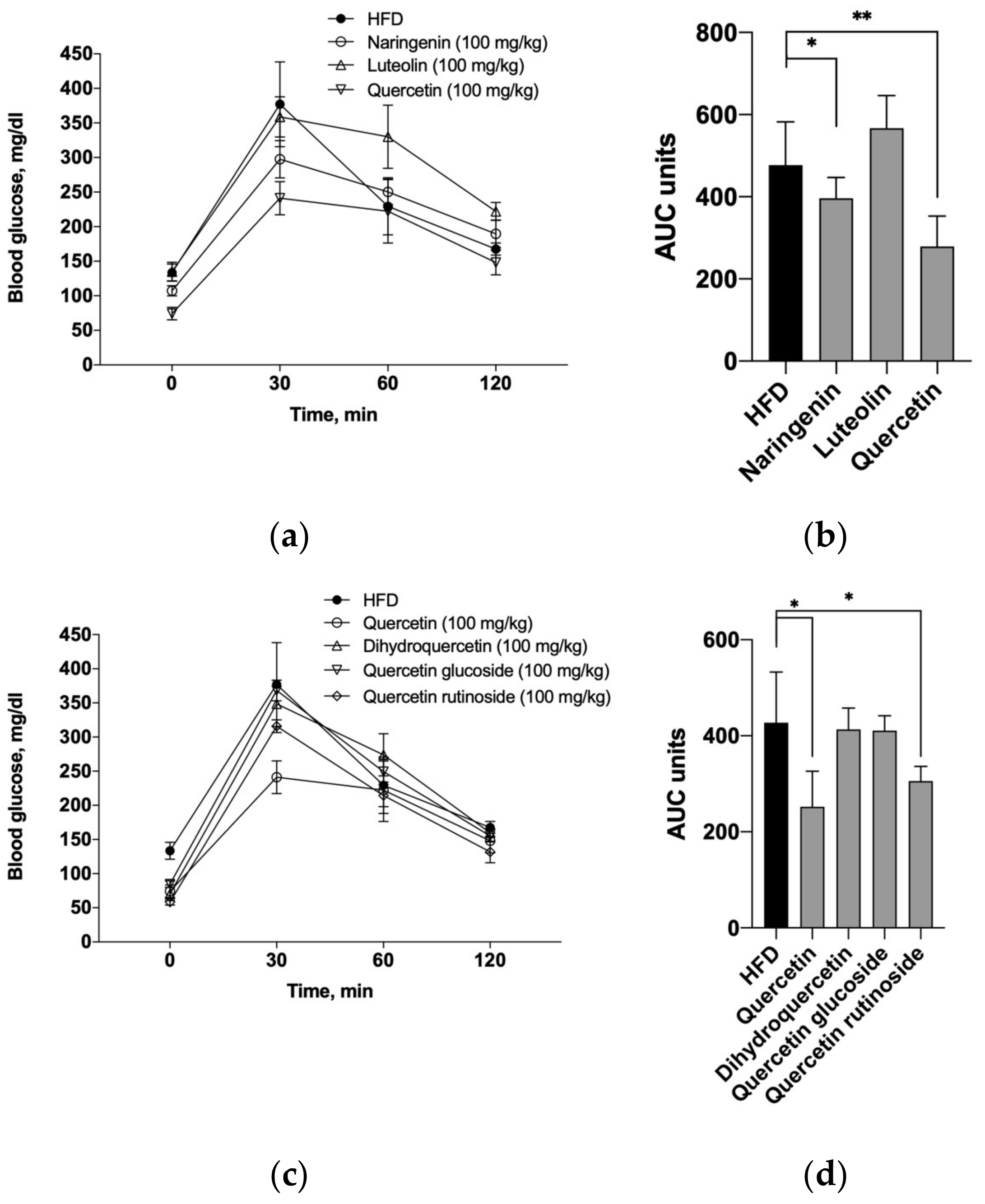
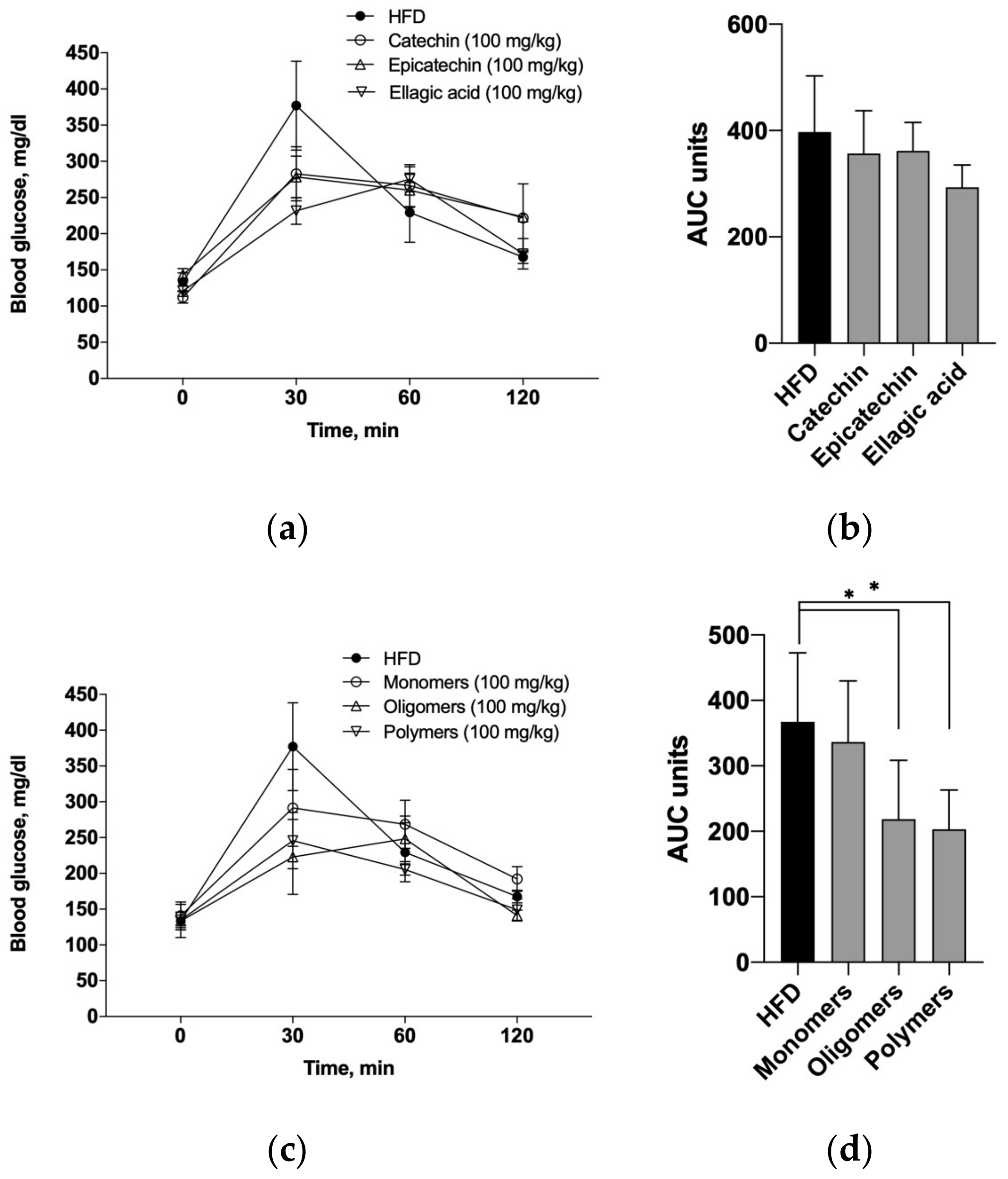

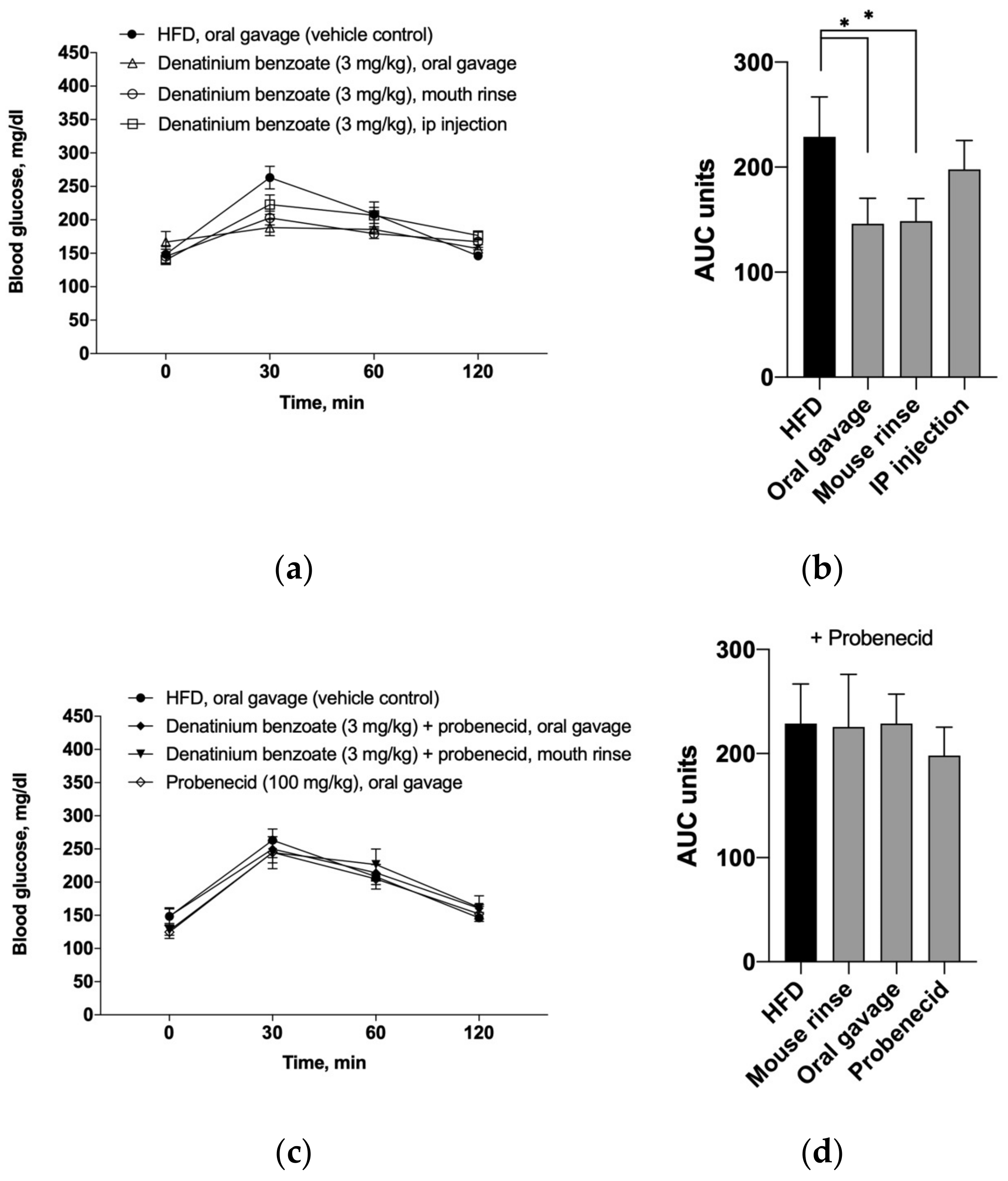
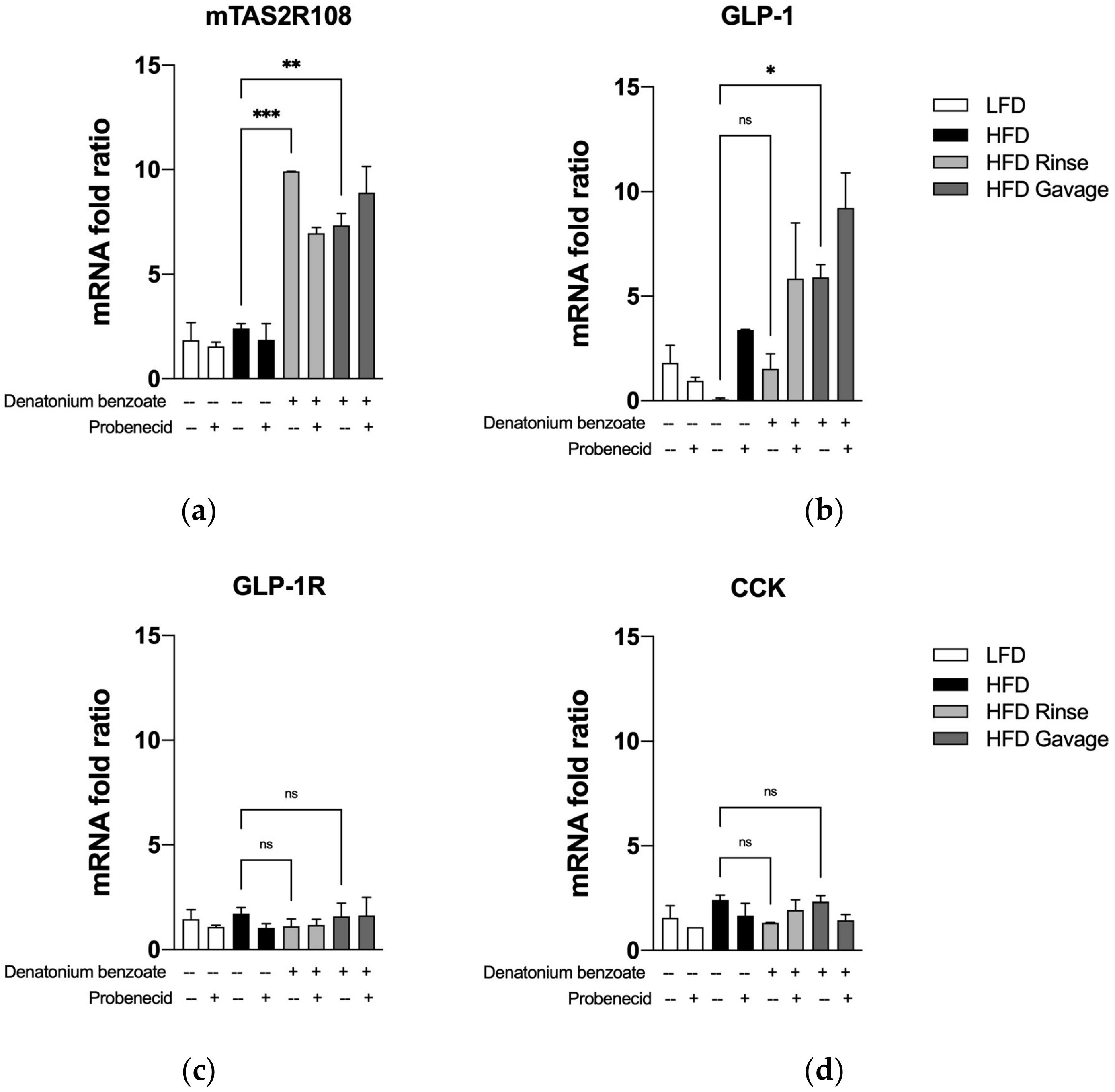
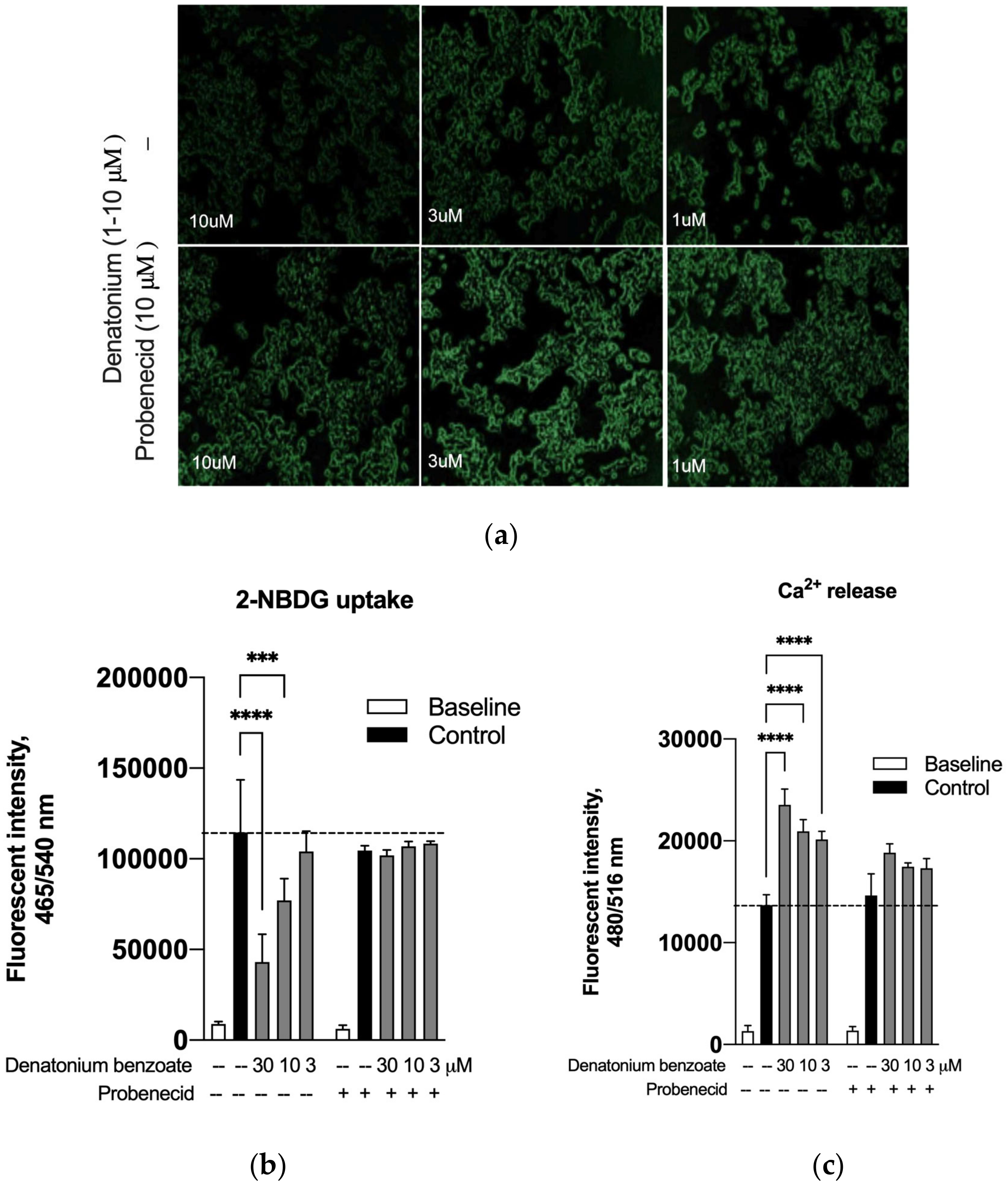
| Chemical Class | Compound | Effective 1 Conc., μM | Human 2 TAS2R | Dose, 3 mg/kg | Dietary Sources |
|---|---|---|---|---|---|
| Synthetic ref. | Denatonium benzoate | 0.03–300 | 4, 8, 10, 13, 39, 43, 46, 47 | 3 | Bitter synthetic |
| Metformin | n/a | n/a | 100 | Diabetes medicine | |
| Alkaloids | Caffeine | 300 | 7, 10, 14, 43, 46 | 30 | Coffee |
| Quinine | 10 | 4, 7, 10, 14, 39, 40, 43, 46 | 100 | Tonic water | |
| Yohimbine | 300 | 1, 4, 10, 38, 46 | 30 | Dietary supplement | |
| Phenolic acids | Gallic acid | 220 | 4, 14 | 300 | Celery seed, cloves, tea, wine |
| Protocatechuic acid | 100 | 14, 30 | 300 | Star anise, chicory greens | |
| Syringic acid | 570 | n/a | 300 | Sage, thyme, oregano | |
| Vanillic acid | 1500 | 14 | 300 | Chestnut, basil, oregano, sage | |
| Anthocyanins | Cyanidin, delphinidin | 30–250 | 14, 39 | 100 | Elderberry, berries, grape, plum |
| Flavones | Luteolin | 2 | 14, 39 | 100 | Mint, sage, oregano, artichoke |
| Flavonols | Quercetin | 1 | 14, 39 | 100 | Capers, cloves, cumin, caraway, oregano, buckwheat, onion |
| Dihydroquercetin (taxifolin) | 60–120 | 14, 39 | 100 | ||
| Quercetin-3-O-glucoside | 28 | n/a | 100 | ||
| Quercetin-3-O-rutinoside | n/a | n/a | 100 | ||
| Flavanones | Naringenin | 10 | 14 | 100 | Oregano, mint, citrus |
| Flavanols | Catechin | n/a | n/a | 100 | Chestnut, dark chocolate, cocoa powder, apple, tea |
| Epicatechin | 1000 | 4, 5, 14, 39 | 100 | ||
| Tannins | Proanthocyanidin monomers | See flavanols | 100 | ||
| PAC oligomers (DP 2–10) | 400–500 | n/a | 100 | Chokeberry, rosehips, cranberry, blueberry | |
| PAC polymers (DP 11+) | n/a | n/a | 100 | ||
| Ellagic acid | n/a | n/a | 100 | Chestnut, raspberry, blackberry | |
| Stilbenes | Rhaponticin | n/a | n/a | 100 | Rhubarb |
| Inhibitor ref. | Probenecid | – | 16, 38, 43 | 3 | Gout medicine |
| Bitter Taste Receptors | Clustering Based on Multiple Sequence Alignment 1,2,3 | ||||||||||||||||||||||||
|---|---|---|---|---|---|---|---|---|---|---|---|---|---|---|---|---|---|---|---|---|---|---|---|---|---|
| Broad specificity (*) | * | * | * | * | * | ||||||||||||||||||||
| Human hTAS2R 4,5 | 1 | 3 | 4 | 5 | 7 | 8 | 9 | 10 | 13 | 14 | 16 | 38 | 39 | 40 | 41 | 42 | 43 | 44 | 45 | 46 | 47 | 48 | 49 | 50 | 60 |
| Mouse mTAS2R | 119 | 137 | 108 | X 6 | 130 | 104 | 102 | 103 | 118 | 138 | 139 | 144 | 126 | 131 | 120 | 135 | |||||||||
| 105 | 121 | 109 | 134 | 122 | |||||||||||||||||||||
| 106 | 124 | 110 | 143 | 136 | |||||||||||||||||||||
| 107 | 113 | ||||||||||||||||||||||||
| 114 | 115 | ||||||||||||||||||||||||
| 116 | |||||||||||||||||||||||||
| 117 | |||||||||||||||||||||||||
| 123 | |||||||||||||||||||||||||
| 125 | |||||||||||||||||||||||||
| 129 | |||||||||||||||||||||||||
| 140 | |||||||||||||||||||||||||
| Parameters | LFD | |||||||
|---|---|---|---|---|---|---|---|---|
| Weeks | 1 | 2 | 3 | 4 | 5 | 6 | 7 | 8 |
| Body weight, g | 24.6 ± 0.4 | 25.2 ± 0.4 | 24.3 ± 0.4 | 26.9 ± 0.4 | 26.6 ± 0.4 | 27.3 ± 0.4 | 27.6 ± 0.5 | 28.1 ± 0.5 |
| Body weight gain, g | 0.6 ± 0.7 | 0.4 ± 0.7 | 2.3 ± 0.7 | 1.9 ± 0.7 | 2.6 ± 0.7 | 2.96 ± 0.7 | 3.5 ± 0.7 | |
| Food intake, g/mouse/d | 2.32 ± 0.05 | 2.57 ± 0.05 | 2.56 ± 0.07 | 2.73 ± 0.05 | 2.67 ± 0.05 | 2.80 ± 0.06 | 2.78 ± 0.07 | 2.76 ± 0.04 |
| Fasting glucose, mg/dL | 79 ± 2 | 79 ± 2 | ||||||
| HFD | ||||||||
| Weeks | 1 | 2 | 3 | 4 | 5 | 6 | 7 | 8 |
| Body weight, g | 28.8 ± 0.3 | 29.9 ± 0.4 | 30.9 ± 0.6 | 31.8 ± 0.5 | 31.6 ± 0.5 | 32.7 ± 0.6 | 33.2 ± 0.5 | 33.9 ± 0.8 |
| Body weight gain, g | 1.1 ± 0.7 | 2.2 ± 0.7 ** | 3.0 ± 0.7 * | 2.8 ± 0.7 ** | 3.9 ± 0.7 ** | 4.4 ± 0.7 ** | 5.1 ± 0.7 ** | |
| Food intake, g/mouse/d | 3.96 ± 0.26 * | 3.56 ± 0.39 * | 4.46 ± 1.27 ** | 2.83 ± 0.14 | 3.97 ± 0.11 * | 3.61 ± 0.33 * | 4.51 ± 0.26 ** | 4.07 ± 0.48 * |
| Fasting glucose, mg/dL | 138 ± 8 ** | 159 ± 5 ** |
Disclaimer/Publisher’s Note: The statements, opinions and data contained in all publications are solely those of the individual author(s) and contributor(s) and not of MDPI and/or the editor(s). MDPI and/or the editor(s) disclaim responsibility for any injury to people or property resulting from any ideas, methods, instructions or products referred to in the content. |
© 2024 by the authors. Licensee MDPI, Basel, Switzerland. This article is an open access article distributed under the terms and conditions of the Creative Commons Attribution (CC BY) license (https://creativecommons.org/licenses/by/4.0/).
Share and Cite
Palatini Jackson, K.M.; Mhawish, R.; Komarnytsky, S. Bitter Phytochemicals Acutely Lower Blood Glucose Levels by Inhibition of Glucose Absorption in the Gut. Endocrines 2024, 5, 304-322. https://doi.org/10.3390/endocrines5030022
Palatini Jackson KM, Mhawish R, Komarnytsky S. Bitter Phytochemicals Acutely Lower Blood Glucose Levels by Inhibition of Glucose Absorption in the Gut. Endocrines. 2024; 5(3):304-322. https://doi.org/10.3390/endocrines5030022
Chicago/Turabian StylePalatini Jackson, Kimberly Marie, Reham Mhawish, and Slavko Komarnytsky. 2024. "Bitter Phytochemicals Acutely Lower Blood Glucose Levels by Inhibition of Glucose Absorption in the Gut" Endocrines 5, no. 3: 304-322. https://doi.org/10.3390/endocrines5030022
APA StylePalatini Jackson, K. M., Mhawish, R., & Komarnytsky, S. (2024). Bitter Phytochemicals Acutely Lower Blood Glucose Levels by Inhibition of Glucose Absorption in the Gut. Endocrines, 5(3), 304-322. https://doi.org/10.3390/endocrines5030022







